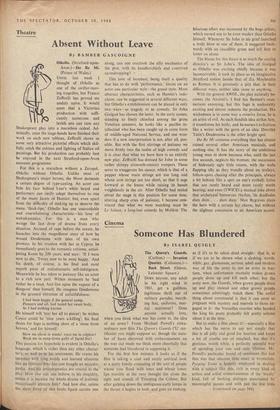Theatre
Absent Without Leave
By BAMBER GASCOIGNE Othello. (Stratford-upon- Avon.)—Do Re Mi. (Prince of Wales.) For this is a marathon without a Zatopek, Othello without Othello. Unlike most of Shakespeare's major heroes, the Moor demands a certain degree of type-casting. An actor can hide his face behind Lear's white beard and performers can easily adapt themselves to one of the many facets of Hamlet; but, even apart from the difficulty of making up to deserve the name 'thick-lips,' Othello has one unavoidable and overwhelming characteristic—his love of melodramatics. For this is a man 'who wrings the last drop of drama from every situation. Accused of rape before the senate, he launches into the magnificent story of how he wooed Desdemona with tales of his own prowess. In his reunion with her in Cyprus he immediately goes to the romantic extreme, antici- pating Keats by 200 years, and says: 'If I were now to die, 'Twere now to be most happy.' And his death, of course, is his final and most superb piece of melodramatic self-indulgence. Meanwhile he has taken to jealousy like an actor to a rich new part. Within moments he 'had rather be a toad, And live upon the vapour of a dungeon' than himself. He imagines Desdemona in the grossest extremes of unfaithfulness: I had been happy if the general camp,
Pioneers and all, had tasted her sweet body,
So I had nothing known.
He himself will 'tear her all to pieces'; he wishes Cassio could be 'nine years a-killing'; his final desire for Iago is nothing short of a 'stone from heaven,' and for himself : Blow me about in winds! roast me in sulphur!
Wash me in steep-down gulfs of liquid fire! This passion for hyperbole is evident in Othello's language, which is richer than any other charac- ter's, as well as in his sentiments. He crams his speeches with long words and learned allusions like an illiterate who has just bought an encyclo Ixedia. And his melodramatics are crucial to the play. How else can one believe in his stupidity, unless it is because the whole. drama of jealousy Mysteriously attracts him? And how else, unless the sheer force of this brute figure carries one along, can one overlook the silly mechanics of the plot, with its handkerchiefs and contrived eavesdropping? - This love of bombast, being itself a quality that has to do with 'performance,' forces on an actor one particular style—the grand style. More abstract characteristics, such as Hamlet's inde- cision, can be suggested in several different ways, but Othello's exhibitionism can be played in only two ways—as tragedy or as comedy. Sir John Gielgud has chosen the latter. In the early scenes, standing so finely chiselled among the gross Venetian senators, he looks like a pacifist in- tellectual who has been caught up in some form of middle-aged National Service, and one won- ders if a new interpretation is not, after all, pos- sible. But with the first stirrings of jealousy we move firmly into the realm of high comedy and it is clear that what we have here is an entirely new play. Zeffirelli has dressed Sir John in some rather skimpy sixteenth-century rompers. These serve to exaggerate his stance, which is that of a puppet whose main strings are too long and whose arm strings are too short, so that it sags forward at the knees while raising its hands weightlessly in the air. After Othello had reeled about the stage in this position for some time, uttering sharp cries of jealousy, I became con- vinced that what we were watching must be Le Jaloux, a long-lost comedy by Moliere. The hilarious effect was increased by the huge pillars, which turned out to be even weaker than Othello himself. Whenever Sir John in his grief launched a body blow at one of them, it staggered back- wards with an inaudible grunt and left him to totter on alone.
The blame for this fiasco is as much the casting director's as Sir John's. The idea of Gielgud as Othello was exciting chiefly because it was inconceivable; it took its place as an imaginative Stratford notion beside that of Zia Moyheddin as Romeo. It is-genuinely a pity that, in their different ways, neither idea came to anything.
With the general AWOL, the play naturally be- comes the Ancient's. I find Ian Barmen's man- nerisms annoying, but this lago is undeniably exciting and almost redeems the production. His wickedness is in some way a creative force, he is an artist of evil. As each fiendish idea strikes him, it transforms his body; and he nurses it to fruition like a writer with the germ of an idea. Dorothy Tutin's Desdemona is the other bright spot.
Do Re Mi contains everything that has almost ruined several other American musicals, and nothing else. It has the story of the ambitious young man in show business who, until the last five seconds, neglects his woman; the succession of hideously ugly little rooms, with the walls flapping idly as they trundle about on trolleys; follow-spots chasing after the principals, always a bit behind, like a spot on one's eyeball; lyrics that are rarely heard and more rarely worth hearing; and even (TWICE) a musical joke about that archetypal humorous rhythm, 'de deedledce dum dum . . . dum dum.' Max Bygraves plays the hero with a certain fey charm, but without the slightest concession to an American accent.






































 Previous page
Previous page